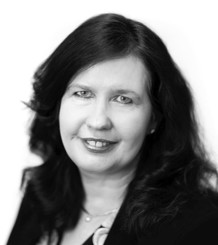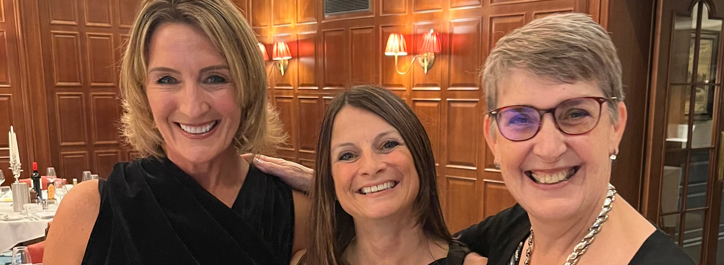Dr Hazel McLaughlin shares her top tips on diversity and inclusion
 We were delighted to welcome Dr Hazel McLaughlin as a guest speaker for our Women’s Leadership Programme. Hazel is president-elect and will be president in 2020 for the British Psychological Society. This is the first time in 20 years the president has been an occupational psychologist expert. She has built on her long-standing interest in women in business and was nominated for the Women of the year event on two consecutive years in her mid-career. Hazel formerly headed up the Talent Management and Diversity & Inclusion Practices at OE Cam.
We were delighted to welcome Dr Hazel McLaughlin as a guest speaker for our Women’s Leadership Programme. Hazel is president-elect and will be president in 2020 for the British Psychological Society. This is the first time in 20 years the president has been an occupational psychologist expert. She has built on her long-standing interest in women in business and was nominated for the Women of the year event on two consecutive years in her mid-career. Hazel formerly headed up the Talent Management and Diversity & Inclusion Practices at OE Cam.
Hazel has a passion for diversity and inclusion and has become a renowned speaker on topics including women in leadership, diversity and people strategy issues. Having shared some extremely valuable insights with the delegates and sponsors on our current Women’s Leadership Programme, we caught up with her for five minutes afterwards to ask a few more questions.
Why did you want to speak at our Women’s Leadership Programme?
Through my work, I am well aware of the challenges of being different and the importance of including all people, irrespective of gender, race, orientation or physical challenges. Because of this, I have a longstanding interest in supporting initiatives which build diversity and inclusion. I recognise how hard it is to overcome prejudices and stereotypes. It is a complex field and the solutions are not self-evident nor are they easy.
What did you share with the delegates?
To understand some of the current challenges facing women in business I looked back at the historically changing perceptions around women and showed how some early 20th century attitudes are still around today. I was also able to share my own journey as a female leader, and my work on diversity and inclusion and the impact for leadership and change. While everyone’s experience is different, and there are no easy answers or magic bullets, we can support, encourage and energise each other. There is still a need to call out the behaviours that stereotype women, to challenge unconscious bias and to enable people to be judged on their capability and contribution.
Why is diversity and inclusion so important?
It is so important to include different people with different perspectives. When we pay attention to others this can enhance thinking, innovation and the quality of decision-making in organisations.
How can people make a difference?
Mindsets and culture matter, so I encourage everyone to be proactive in shaping how we interact, communicate and behave in the workplace. I encourage female leaders and women in business to be confident, make the most of their potential and to speak up and be counted. To help them do this, I also encourage them to look for role models and to seek out mentors and sponsors of both sexes. Male and female mentors bring different perspectives in supporting aspiring leaders to be their best self and to advance their career and their impact.
It is so important to keep learning and building skills, capabilities and social capital. In the journey of life; we are not perfect but we should be brave; to experience, make mistakes and learn from them. Accept that change is inevitable and that agility and resilience enhance a leader’s successes and impact. Work together with others and let your voice be heard.
What are your top tips for enhancing diversity and inclusion?
At the event I shared the following top ten tips:
- Use training and awareness workshops as a tool but not an end in themselves. Integrate them with other initiatives and actions.
- Ensure senior executive sponsorship and involvement. Encourage them to ‘walk the talk’ and to be role models, sponsors and mentors.
- Create a culture which supports diversity and inclusion, values led leadership can reinforce and support behaviour change.
- Increase involvement and include different groups and people from different backgrounds. Mixed teams add to diversity of thought and enhance quality in discussions. This leads to better decision making.
- Encourage an inclusive mindset; reward inclusive behaviour and ‘call it out’. Create policies and procedures that align with these values and reinforce the core messages.
- Review decision-making and accountability in the organisation. Enable inclusion and diversity in the decision-making process and ensure accountability.
- Leadership and mentoring programmes can add value but think flexibly and use resources across the organisation. Avoid a top down approach only and build informal networks that will have a life of their own.
- Enable people to be at their best by providing flexibility in terms of working conditions. The focus is on the end objectives and results rather than a prescribed way to achieve them.
- Encourage communication, relationship building and networks. Enable people to grow and develop through these networks.
- Build equality of opportunity into the very fabric of the organisation. Enable disadvantaged groups to gain confidence and to build social capital. Encourage those who are less vocal to have a voice.
What do you think of our Women’s Leadership Programme?
I would like to thank Pure for inviting me to talk at the event and for the opportunity to meet with these leaders of the future. I was really encouraged to see the ways in which the Women’s Leadership Programme is adding to their success and I was inspired by their ideas, capability and energy. The Women’s Leadership Programme is an excellent steppingstone which will enhance the delegates’ development and I wish them all every success as they continue to progress in their career journey.
ABOUT HAZEL
Dr Hazel McLaughlin is a Doctor of Psychology with her thesis on ‘Relational Power; uses and implications in organisations’.
She is a regular guest lecturer and keynote speaker on topics including women in leadership, diversity and people strategy issues. She is an Associate Fellow of the British Psychological Society and co-founder of its Board Effectiveness Group, using psychology to enhance corporate governance and senior team interaction. Having held both Executive and Non-Executive Board positions in international consultancies, Hazel has also published academically and has been the lead author on several BPS white papers and government consultations.
About Women in Leadership
Whether you are an aspiring female leader or have a member of your team looking to develop their leadership skills further, the Women’s Leadership Programme sets to support the East of England. To register your interest, please contact Lucy Plumb, 01223 666 455



